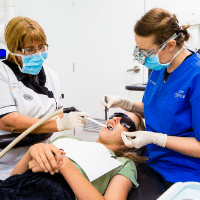Top 5 Benefits of Regular Dental Visits

The Importance of Regular Check-ups
Every dentist understands the temptation to postpone regular dental check-ups but, there are sound reasons to visit your dentist on a regular basis.
Early Detection
The first cab off the rank in terms of reasons to visit your dentist regularly is that routine check-ups allow for early detection of dental problems. Basically, if you’re in more regularly, then we are more likely to find an issue when it’s still small. Often, if we can identify an issue just as it starts, it may be something that can be readily corrected. For instance, it might be a problem that can be addressed by you at home through something as simple as changing your habits around cleaning your teeth or tweaking your diet. As a general rule, if we can pick things up early, they’re more easily fixed.
It Avoids Bad Breath and Tartar Build-up
This is a big drawcard for many patients. By having a hygienist clean your teeth on a regular basis, it helps prevent any problems with your gums, which can assist with issues like bad breath.
Regular removal of tartar is also important because tartar can also cause gum issues. In particular, tartar provides a safe haven for bacteria that can cause all sorts of other issues for you, from gum disease through to bad breath.
It’s Less Expensive in the Long Run
If you can address dental problems in their infancy, they’ll be less expensive down the track when the problem gets bigger. Picking up problems while they’re still small means that the cost of dental treatment over the course of your lifetime is going to be less expensive.
It Can Put Your Mind at Ease
The longer patients delay check-ups, the more nerve-wracking a visit to the dentist becomes. Among other things, patients can become increasingly anxious about the extent of work that might be required, particularly if it’s been a while between visits. A regular schedule of check-ups avoids this entirely.
In terms of what constitutes a schedule of regular check-ups, the answer is that it depends. Generally speaking, we work on the basis of a check-up every six months. However, there are patients about whom we’re not particularly worried because they’re looking after their teeth really well and have a good diet. If a patient maintains that type of history over a number of years, it may be necessary to see them only once a year.
At the other end of the scale, there are people we are especially worried about because of ongoing disease issues, in which case we may need to see them three or four times a year.
As for the frequency required for dental X-rays, again the answer depends on how concerned we are about a patient’s dental issues so, it can be anywhere from once a year for people with complex dental issues through to every three or four years for people with a stable dental history.
Your Dentist and Hygienist Will Be Better Placed to Understand Your Concerns
There’s another benefit that comes with familiarity—if you’re seeing the same dentist and hygienist on a regular basis, they will come to understand your particular issues and risks, and be much better placed to make accurate recommendations for you.
The content has been made available for informational and educational purposes only. Plaza Dental does not make any representation or warranties with respect to the accuracy, applicability, fitness, or completeness of the content.
The content is not intended to be a substitute for professional personal diagnosis or treatment. Always seek the advice of your dentist or another qualified health provider with any questions you may have regarding a dental or medical condition. Never disregard professional advice or delay seeking it because of something you have read or seen on the Site.
Services we mentioned:
Related Articles
Tooth Sensitivity: Just Needs Sensitive Toothpaste, Or Symptom of Bigger Problems?
‘Sensitivity’ is the new buzzword in dentistry. Dentists are more sensitive than ever before to the needs of their...
Propolis Can Help Manage Gingivitis And Periodontal Disease
Propolis. Bee glue. The resinous tree, branch and leaf raw materials of certain plants that bees collect to make the...








